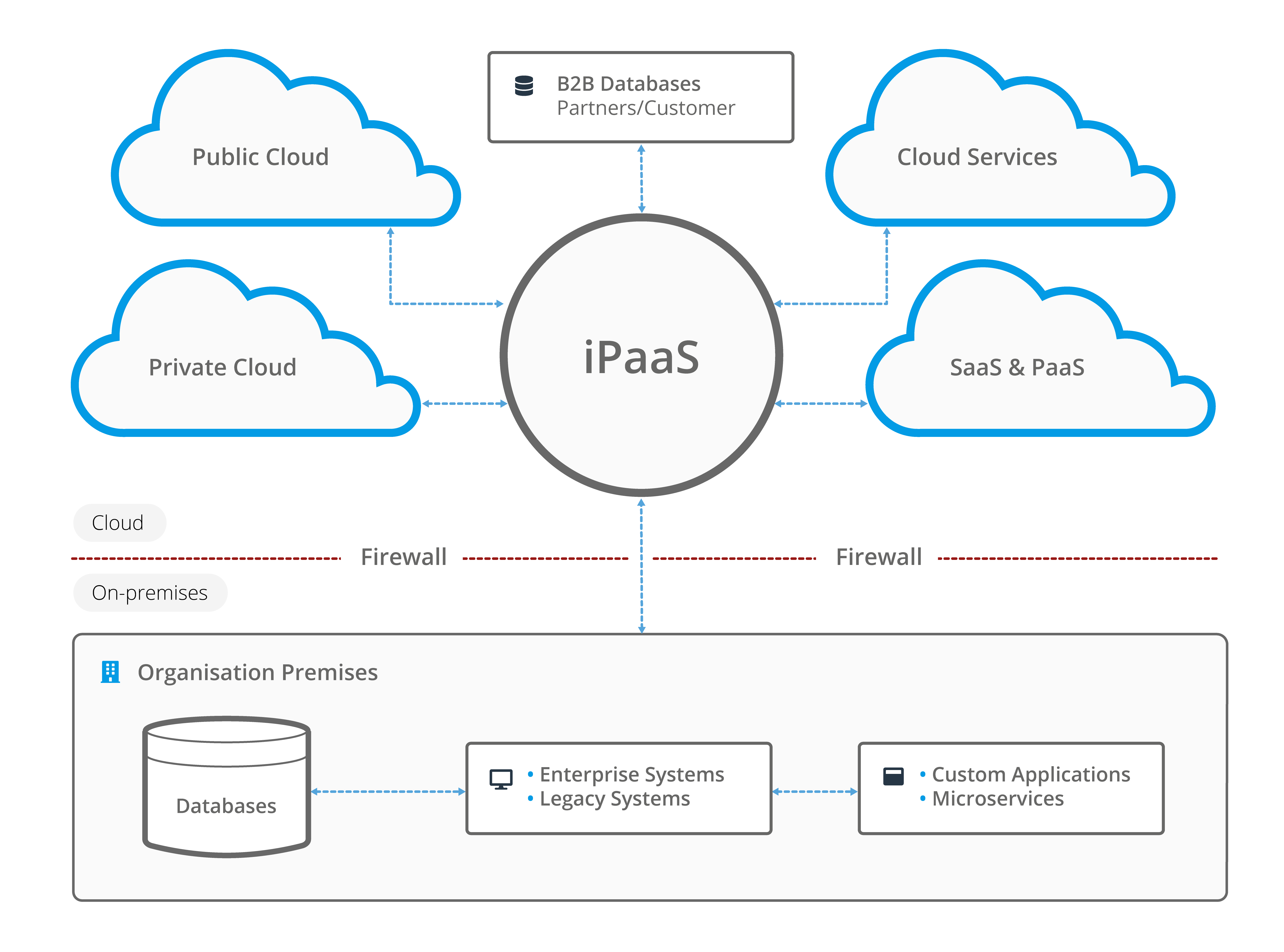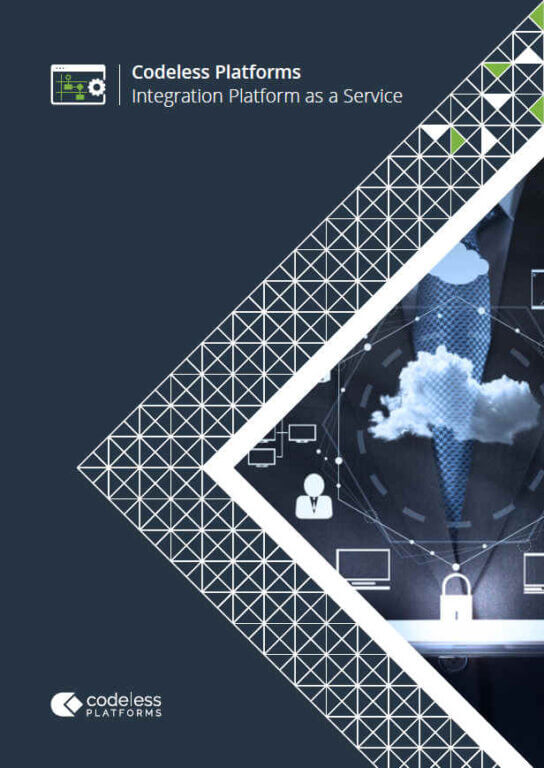What are the benefits of iPaaS?
Integration platform as a service (iPaaS) is a quick and cost-effective way for organisations of any size to rapidly improve and streamline business processes by integrating a wide range of business systems and applications, and then automating the processing and management of data.
As iPaaS is hosted in the cloud it facilitates rapid deployment, delivers greater flexibility and scope, increases efficiency and productivity, improves scalability and reduces the resources required, thus reducing cost, which results in immediate ROI.
Rapid deployment
Why is it quicker to set up integration and automation via iPaaS?
Well, the simple reason is that iPaaS removes the need for organisations to invest in bespoke development or coding. They can simply subscribe to a particular service and immediately start integrating applications, loading data, automating business processes, migrating users, and incorporating the application into their IT ecosystem.
This approach is far removed from the traditional integration techniques that have dominated the market, in which the software had to be deployed on-premises. These solutions would often require a fair amount of resources for development and coding.
However, iPaaS is built on the concept of low-code or no-code, and tends to provide a range of pre-built integration tools and low-code API connectors, which enables organisations to quickly connect apps and business systems.
An intuitive design and graphical user interface that provides a visual representation of the connections and business processes being automated also helps speed up the roll out and deployment.
Organisations are therefore able to get up and running much quicker, which helps to provide immediate ROI.
Reduced resources
The speed of deploying iPaaS ultimately means that organisations require fewer resources to set up an integration solution.
This is enhanced by the fact that all the tools and connectors are hosted, upgraded and maintained by the vendor or its channel partner, depending on the business model. System integration and data migration therefore requires less personnel, and IT managers or business owners don’t have to allocate resources to this aspect of their ecosystem, freeing them up to concentrate on other aspects of the business.
Likewise, with an intuitive, visual interface, any changes that are required will rely less heavily on developers to implement the changes. Multiple users will often be able to easily add new connections or automate new tasks.
Download Codeless Platforms' iPaaS Brochure
Reduced costs
A reduction in resources required is obviously reflected in a reduction in costs.
iPaaS technology is therefore a more cost-effective solution than previous integration solutions. It is usually cheaper than middleware solutions, especially as it is hosted by the provider and operates on a subscription basis. This removes any potential expensive upfront costs that are usually incurred by deploying a middleware solution.
Users will only pay for the services and connections that are required, rather than installing a full-blown solution, making it a much more flexible and manageable expense. Simply paying for what is essential to run the business.
Greater flexibility and scalability
The flexibility of iPaaS, and the fact that it is a subscription-based model, means that it is much easier to add new applications to the IT ecosystem and tweak business processes as the organisation grows. It also removes an element of risk.
An organisation can simply select new connectors for a particular application and upgrade the subscription to include the new integration.
Alternatively, if the application is not suitable for any reason, or needs to be substituted, it can easily be removed and replaced with an alternative solution, thus reducing the monthly or yearly subscription fee.
This also means that customers are not tied to a particular piece of software, especially where integration is concerned, as they won’t have to worry about writing off any development costs that would have been incurred with a bespoke integration solution.
Further benefits of iPaaS include the fact that it is not restricted by the locations of any applications or business systems. iPaaS can connect any disparate systems together, whether they are on-premises or cloud-based applications and services.
A hybrid integration strategy will also be able to accommodate subsidiaries or business partners that may have a mix of on-premises or cloud applications that you regularly need to synchronise data with.
This ability to provide a hybrid integration environment is therefore a major strength of iPaaS.
It’s this flexibility that enables organisations to future-proof their IT environment, helping to expand the lifespan of existing systems and protect future upgrade paths.

Image: Benefits of iPaaS: A typical scenario using iPaaS to integrate on-premises with cloud-based applications and services
Superior data visibility and management
With a centralised environment to manage real-time integrations, processes and workflows, iPaaS can provide better visibility and management of data flows.
Being hosted in a cloud environment, iPaaS is in an ideal position to handle high-volume, real-time data processing. With the ability to read, write and convert different file formats, such as XML, CSV and JSON, it can easily automate the transfer of data between various systems, whether cloud-to-cloud or on-premises to cloud.
Data files can be easily imported and exported between systems, including file sharing software, such as One Drive, Dropbox and Google Drive.
With access to real-time data between the different systems and across the organisation, employees and management can make better decisions to help improve efficiencies.
Additionally, pre-built connectors and business process automation tools not only speed up the integration process and reduce the number of resources required, as market-proven solutions they deliver better results.
Improved customer management
The ability to host and manage multiple customers or instances via iPaaS is another significant benefit.
An iPaaS host can create multiple instances on a single server, providing each customer with a secure, isolated database, incorporating their own accessibility protocols.
This not only reduces redundancy issues, it also provides the ability to onboard new customers quickly and easily, without any detrimental effect to the other tenants.
These instances can then be monitored and managed by the host via a single user-interface, such as a landscape management module. Within this, the host will be able to manipulate automation tasks, monitor performance and adjust licensing.
From an end-user perspective, having access to multiple instances could enable them to set up different instances for different companies within their own company structure. Whilst rolling out the solution, they could also create production, test and live environments using these instances.
Learn about multi-tenant and multi-instance
Enhanced security
As a cloud-based offering, iPaaS solutions usually provide better and more stringent security measures than legacy integration systems.
Much of the responsibility for this will be assigned to the iPaaS provider, such as encrypted end-to-end security using AES-256 to fully protect data.
However, each customer can also apply their own security measures and protocols, such as access control and single sign-on integrations.
This includes support for multi-factor authentication, including OpenID Connect, Azure Active Directory and OAuth2.
An iPaaS customer will also be able to monitor all processes and activity, and receive alerts about any significant changes or issues, such as too many API calls etc.
For more information on the benefits of iPaaS and how it can help your business, download the brochure below or call us on +44(0) 330 99 88 700.


